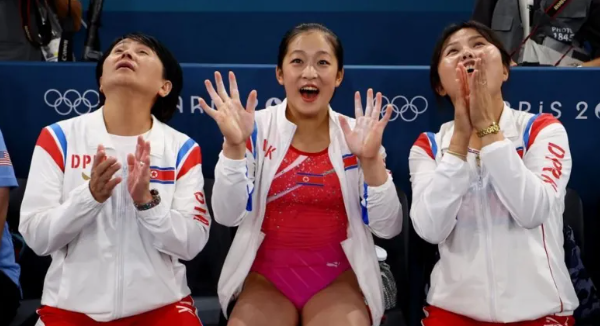As the Paris gymnastics arena erupted in cheers for American Simone Biles as she clinched her third gold medal at the 2024 Olympics, one of the applauding figures was An Chang-ok, a North Korean rival.
During Saturday’s women’s vault final, athletes from North Korea shared the stage with competitors from South Korea and the United States. An, 21, smiled and waved at TV cameras, even embracing at least one fellow finalist—a rare moment of interaction with foreigners for a young woman carefully chaperoned on her trip abroad.
North Korea’s decision to send athletes to these Games—where two even posed for a selfie with rivals from the South—has sparked hopes that the secretive nation may be cautiously reopening after a prolonged period of isolation. This comes after a tense period marked by the North sending waste-filled balloons across the border to the South.
Jean H. Lee, a former Associated Press journalist who established the agency’s first bureau in Pyongyang, noted that the North’s participation in these Games marks a “remarkable” return to the international community. The country did not send any athletes to the Tokyo Olympics in 2021, as it intensified its isolation due to the Covid-19 pandemic.
In Paris, however, North Korea is “making an effort to rejoin the international community,” Lee observed, despite ongoing tensions related to its nuclear program, which remains a significant issue.
The North’s nuclear ambitions continue to strain relations with both South Korea and the US, but on Saturday, there were no signs of hostility among the gymnasts from the three nations. This new generation of North Korean athletes has already secured two silver medals in Paris, occasionally surprising sports commentators who were uncertain about what to expect from them.
According to Professor Ramon Pacheco Pardo of King’s College London, who has extensively studied the two Koreas, winning medals is not the only goal for the North in these Games.
The long-standing North Korean strategy of “sports diplomacy” involves limited participation in international events to portray the country as normal, according to Professor Ramon Pacheco Pardo. He explained that athletes are among the “few actors” North Korea has who are less likely to be viewed with suspicion by the global community.
The difference in support for An and Biles was striking. During a previous competition at the Paris Games, Biles was enthusiastically cheered on by numerous celebrities in the audience, including Lady Gaga, Ariana Grande, Tom Cruise, and Snoop Dogg. On Saturday, thousands of fans shouted her name in support.
In contrast, An received only polite applause from neutral spectators. She had no fellow North Koreans in attendance, as ordinary citizens are not allowed to leave their country. It’s also unlikely that anyone back home was watching, as the Games are not being broadcast live in North Korea, according to Radio Free Asia (RFA). BBC Monitoring has only identified a few text reports in the tightly controlled state media.
However, John Everard, the UK’s ambassador to North Korea from 2006 to 2008, noted that “the chattering class of Pyongyang will certainly know the Olympic results as they come in through various sources.”
An is part of a group of 16 North Korean athletes who have arrived in a lavish host city that contrasts sharply with the austere Pyongyang airport where they were filmed departing last month. Everard suggested that top North Korean athletes likely have some awareness of the outside world, but they would still experience a “shock factor.”
One of the most talked-about moments of the Games occurred when a South Korean table tennis player took a selfie with his mixed-doubles partner, who was a silver medalist from North Korea. This rare interaction seemed to transcend boundaries between the two nations, which are still technically at war.
Professor Pacheco Pardo suggested that agreeing to the selfie sent a message from the North and speculated that the move would have had Pyongyang’s approval.
Korea appears to be signaling that its issues lie not with the South Korean people, but with the South Korean government. This moment was not entirely unexpected, as a similar incident occurred in 2016, and two years later, the two Koreas formed a joint women’s ice hockey team at the Winter Games held in the South.
The selfie represents one of the few visible interactions the North has had with the outside world during the Games, alongside a brief press conference featuring the two table tennis stars. Additionally, unverified footage has surfaced showing An holding a collection of pin badges, which are said to be popular among international gymnasts.
After such exposure to the Western world, athletes are likely to undergo a rigorous “debrief” upon returning home to ensure they adhere to the official narrative, according to Lee, who co-hosts the BBC World Service’s Lazarus Heist podcast. Contrary to popular belief, analysts agree that athletes considered to have “failed” would likely not face punishment. However, they might endure intense “self-criticism” sessions.
“The real consequence of not winning a medal isn’t necessarily punishment; it’s the loss of potential benefits,” said Everard. Successful athletes may gain higher social status and rewards like new homes.
It remains uncertain whether this latest instance of sports diplomacy will lead to significant new discussions between the two Koreas. The friendly atmosphere in Paris was momentarily threatened when organizers mistakenly mixed up the names of the two nations during the opening ceremony, for which they later apologized.
Outside the Bercy Arena after Saturday’s gymnastics events, one fan from the Seoul side expressed skepticism about any substantial political changes. Nevertheless, she noted that witnessing athletes sharing the stage served as a reminder that all Koreans are united by something “human.”


